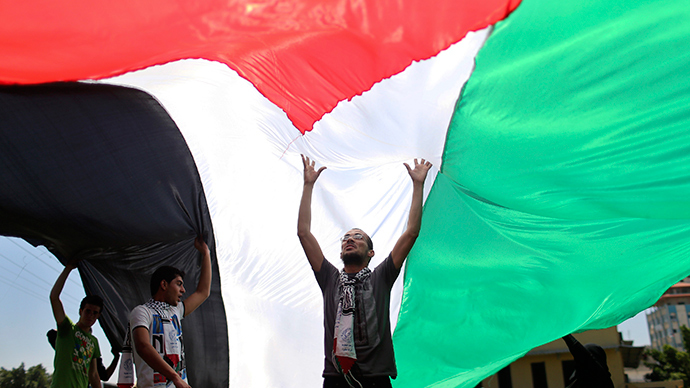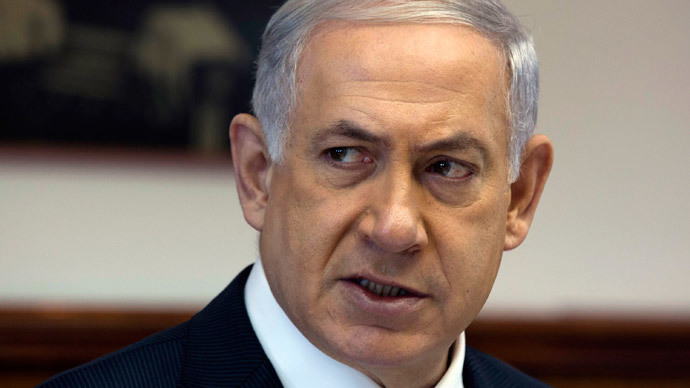End of 'Israeli occupation'? Arabs support Palestinian draft UN resolution

Arab delegations in the UN have thrown their weight behind a Palestinian proposal to reach a final peace deal with Israel within a year and cut off Israeli occupation of Palestinian territories by late 2017. The draft drew fire from the US and Israel.
The Palestinian draft resolution on statehood could come up for a
vote at the Security Council on Tuesday or Wednesday.
Jordanian UN Ambassador Dina Kawar told reporters on Monday that
all 22 Arab delegations approved of the Palestinian proposal. She
said the Jordanians and Palestinians would be trying "to find
the best way and the best timing to vote on the Security Council
resolution."
The Palestinian draft resolution was formally presented to the
council on December 17. It proposes that Israel and the
Palestinians return to the territorial boundaries that existed
before Israel got hold of the West Bank, East Jerusalem and the
Gaza Strip in the 1967 Middle East War. It also calls for a
third-party presence to help oversee Israel's withdrawal and
guarantee Palestinian sovereignty.

Israel, which withdrew troops and settlers from the Gaza Strip in 2005, argues that its eastern border would be endangered if it withdrew completely from the West Bank. Prime Minister Benjamin Netanyahu said he expected the "responsible members" of the international community to oppose the resolution. However, several European parliaments have recently adopted non-binding motions calling for the recognition of Palestine. Ireland, the UK, France, Spain and Sweden were among them.
Netanyahu pledged on Monday that if the international community did not reject the Palestinian proposal, then Israel would.
“Israel will oppose conditions that will endanger our future," he said.

The US has also rejected the proposal on the grounds that it
allegedly failed to address Israel's security needs.
"We think it sets arbitrary deadlines for reaching a peace
agreement and for Israel's withdrawal from the West Bank, and
those are more likely to curtail useful negotiations than to
bring them to a successful conclusion," US State Department
spokesman Jeff Rathke told a news briefing on Monday.
As many as nine Security Council votes are needed to adopt a
resolution, which would then force the United States, a permanent
member of the council, to decide whether or not to veto it. A US
veto could add fuel to the fire, however, enraging Arab allies,
including those in an alliance with America to carry out
airstrikes against the Islamic State (IS, formerly ISIS/ISIL)
militant group in Syria.
Diplomats say it's unlikely that the resolution would gather nine
votes under the current makeup of the council. So it's unclear if
the Palestinians would seek an immediate vote this week or prefer
to wait till January 1, when five new members with
pro-Palestinian views join the Security Council. Angola,
Malaysia, New Zealand, Spain and Venezuela begin their two-year
stint in the council, replacing Argentina, Australia, Luxembourg,
South Korea and Rwanda.
READ MORE: Chief Palestinian negotiator says UN statehood vote to happen this year

Discussions on the draft resolution come amid surge in violence
and failure to return to peace talks. Tensions escalated after
US-brokered talks on Palestinian statehood failed in April.
On Monday Israeli troops shot dead a 17-year-old Palestinian boy
who was throwing stones at drivers in the occupied West Bank near
the northern city of Nablus. Israeli forces said they had fired
warning shots into the air before resorting to live fire.
READ MORE: Israeli serviceman shoots 5yo Palestinian in the face (GRAPHIC IMAGES)
Nearly 20 Palestinians have been killed by the Israeli Army in
the West Bank since June, according to AFP.
The Palestinian Authority has warned that if the joint effort to
win support for a UN resolution comes to nothing, it would join
the International Criminal Court to file suits against Israel.
"If the Arab-Palestinian initiative submitted to the Security
Council to put an end to occupation doesn't pass, we will be
forced to take the necessary political and legal decisions,"
Palestinian leader Mahmoud Abbas said last week.
"If it fails, we will no longer deal with the Israeli
government, which will then be forced to assume its
responsibilities as an occupier," he warned.












